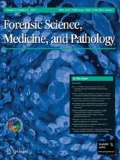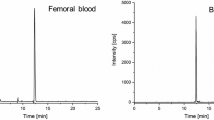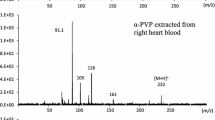Abstract
Aconitine belongs to the Aconitum alkaloids and is a natural toxic substance. Aconitine has been used as a traditional medicine in East Asian culture. Today, aconitine is still in use with or without a prescription, in the Republic of Korea. Here we present a case report of accidental death due to acute aconitine poisoning. An 81-year-old woman ingested liquid that had been heat extracted from the root of the Aconitum plant; she presented to the emergency room 1 h after ingestion. Her electrocardiogram showed irregular ventricular arrhythmias including ventricular tachycardia; she progressed to cardiac arrest. Cardiopulmonary resuscitation and anti-arrhythmic drugs were administered, but the patient did not survive. An autopsy was performed 2 days postmortem. Toxicological analysis was performed, and aconitine was detected by liquid chromatography tandem mass spectrometry. The antemortem blood concentration of aconitine was 39.1 ng/ml and the concentrations of aconitine in the postmortem cardiac blood, peripheral blood, cerebrospinal fluid (CSF), pericardial fluid, and urine were 21.1 ng/ml, 28.6 ng/ml, 6.8 ng/ml, 24.1 ng/ml, and 67.4 ng/ml, respectively. This is the first forensic case report of an aconitine poisoning death in the Republic of Korea with quantitative measurement of aconitine in the antemortem blood and various postmortem body fluids. To the best of our knowledge, this is the first report of the detection of aconitine in the CSF. These data about the distribution of aconitine in the antemortem blood and various postmortem body fluids is helpful for future aconitine poisoning death cases.


Similar content being viewed by others
References
Niitsu H, Fujita Y, Fujita S, Kumagai R, Takamiya M, Aoki Y, et al. Distribution of Aconitum alkaloids in autopsy cases of aconite poisoning. Forensic Sci Int. 2013;227:111–7.
Rentoul E, Smith H. Glaister’s medical jurisprudence and toxicology. Edinburgh, Scotland: Churchill Livingstone; 1973. p. 520–1.
Ito K, Tanaka S, Funayama M, Mizugaki M. Distribution of Aconitum alkaloids in body fluids and tissues in a suicidal case of aconite ingestion. J Anal Toxicol. 2000;24:348–53.
Byard RW. A review of the potential forensic significance of traditional herbal medicines. J Forensic Sci. 2010;55:89–92.
Fu M, Wu M, Wang JF, Qiao YJ, Wang Z. Disruption of the intracellular Ca2+ homeostasis in the cardiac excitation-contraction coupling is a crucial mechanism of arrhythmic toxicity in aconitine-induced cardiomyocytes. Biochem Biophy Res Commun. 2007;354:929–36.
Byard RW, Musgrave I. Herbal medicines and forensic investigations. Forensic Sci Med Pathol. 2010;6:81–2.
Lin CC, Chan TY, Deng JF. Clinical features and management of herb-induced aconitine poisoning. Ann Emerg Med. 2004;43:574–9.
Pullela R, Young L, Gallagher B, Avis SP, Randell EW. A case of fatal aconitine poisoning by monkshood ingestion. J Forensic Sci. 2008;53:491–4.
Moritz F, Compagnon P, Kaliszczak IG, Kaliszczak Y, Caliskan V, Girault C. Severe acute poisoning with homemade Aconitum napellus capsules: toxicokinetic and clinical data. Clin Toxicol (Phila). 2005;43:873–6.
Dickens P, Tai YT, But PP, Tomlinson B, Ng HK, Yan KW. Fatal accidental aconitine poisoning following ingestion of Chinese herbal medicine: a report of two cases. Forensic Sci Int. 1994;67:55–8.
Chan TY. Aconite poisoning following the percutaneous absorption of Aconitum alkaloids. Forensic Sci Int. 2012;226:25–7.
Fujita Y, Terui K, Fujita M, Kakizaki A, Sato N, Oikawa K, et al. Five cases of aconite poisoning: toxicokinetics of aconitines. J Anal Toxicol. 2007;31:132–7.
Usui K, Hayashizaki Y, Hashiyada M, Nakano A, Funayama M. Simultaneous determination of 11 Aconitum alkaloids in human serum and urine using liquid chromatography-tandem mass spectrometry. Leg Med (Tokyo). 2012;14:126–33.
Liu Q, Zhuo L, Liu L, Zhu S, Sunnassee A, Liang M, et al. Seven cases of fatal aconite poisoning: forensic experience in China. Forensic Sci Int. 2011;212:e5–9.
Bhargava KP, Kohli RP, Sinha JN, Tayal G. Role of catecholamines in centrogenic cardiac arrhythmia induced by aconitine. Br J Pharmacol. 1969;36:240–52.
Funding
This research was supported by the Ministry of Education and National Research Foundation of the Republic of Korea (NRF-2018R1D1A1B07049459). This study was funded by NRF-2018R1D1A1B07049459.
Author information
Authors and Affiliations
Corresponding author
Ethics declarations
Conflict of interest
All authors declare that there was no conflict of interest.
This article does not contain any studies involving human participants or animals performed by the author. Moreover, this case report was based on medicolegal autopsy underwent with Court’s warrant requested by the public prosecutor.
Additional information
Publisher’s note
Springer Nature remains neutral with regard to jurisdictional claims in published maps and institutional affiliations.
Rights and permissions
About this article
Cite this article
Cho, Y.S., Choi, HW., Chun, B.J. et al. Quantitative analysis of aconitine in body fluids in a case of aconitine poisoning. Forensic Sci Med Pathol 16, 330–334 (2020). https://doi.org/10.1007/s12024-019-00211-5
Accepted:
Published:
Issue Date:
DOI: https://doi.org/10.1007/s12024-019-00211-5




